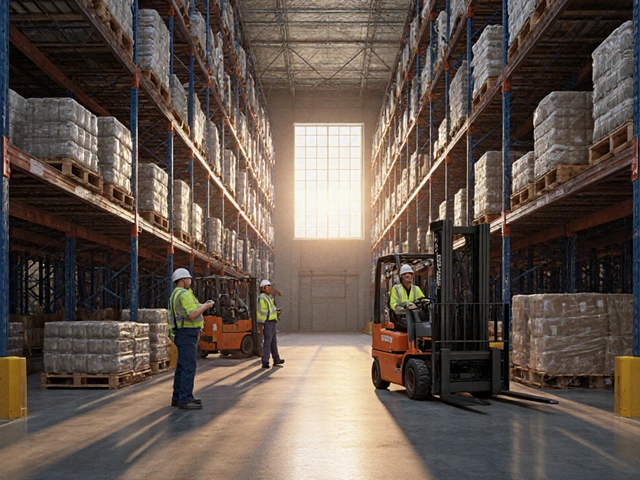In today's fast-paced world, having a package delivered overnight can make all the difference. Whether it's crucial business documents or a last-minute gift, choosing the right shipping carrier is key.
There are several leading carriers offering overnight shipping, each with its unique strengths and specialties. Understanding the factors that contribute to a successful delivery—like cost, speed, and service—is essential for making the best decision.
With some tips and insights, you'll be able to find the carrier that matches your needs perfectly, ensuring your items arrive on time without any fuss.
- The Importance of Overnight Shipping
- Top Overnight Shipping Carriers
- Cost Comparison
- Reliability and Speed
- Customer Service Quality
- Tips for Choosing the Right Carrier
The Importance of Overnight Shipping
Overnight shipping has become a cornerstone of modern logistics. The demand for this service has surged significantly over the years, driven largely by an increase in online shopping and the need for immediate delivery. Whether it's for a critical business deal or a spontaneous personal gesture, the capability to have items delivered the very next day can often spell the difference between success and missed opportunities. The convenience this brings cannot be underscored enough. It allows businesses to operate more efficiently, keeping supply chains nimble and responsive to customer demands. Customers, on their part, have come to expect this level of service as a standard, which means businesses failing to offer it risk falling behind their competitors.
The logistics behind overnight shipping are intricate, requiring a seamless blend of technology, transportation networks, and human resources. Carriers like FedEx and UPS have invested heavily in expanding their networks to enhance their next day delivery capabilities. This is highlighted by the presence of advanced tracking systems, which provide real-time updates to ensure transparency and accountability. According to a report by ShipMatrix, the on-time delivery rate for overnight shipping services hit an all-time high of 98% in recent years, reinforcing the reliability of these services.
"Efficiency in logistics is not just a competitive advantage—it's a necessity," said David Abney, former CEO of UPS. "Customers expect goods and information instantly, and meeting those expectations is critical to success."
Beyond the mechanics, the impact of overnight shipping on customer satisfaction is profound. Individuals value the peace of mind that comes with knowing their shipment will arrive when promised. Various studies have highlighted the direct correlation between expedited shipping options and customer loyalty. In fact, a survey by Deloitte found that 64% of respondents were willing to pay more for guaranteed overnight shipping. This willingness to spend extra underscores the perceived value of quick delivery, which has transformed it from a luxury to a necessity in many sectors.
Overnight shipping also carries significant economic implications. By facilitating fast movement of goods, it enables swift transactions and boosts business revenues. Small businesses, which may rely on a handful of key customers, find that being able to promise immediate delivery can open doors to new opportunities. Importantly, in healthcare and pharmaceuticals, overnight shipping is not just important but life-saving. The rapid transport of medical supplies, vaccines, and medications is often reliant on these services. The pandemic further illustrated how critical it became to have an efficient delivery service as millions depended on timely deliveries for health essentials.
The growing array of service options continues to play a vital role in shaping how overnight shipping is utilized. The market has seen more tailored solutions, from temperature-controlled logistics for perishables to secure shipping for high-value items. With these specialized needs being met, overnight shipping has evolved beyond just speed, focusing on meeting specific customer demands accurately. A Nielsen report detailed how the integration of artificial intelligence and machine learning in logistics is reducing waste and improving delivery networks. The future of overnight shipping, therefore, appears promising as both consumer expectations and logistic capabilities continue to advance.
Top Overnight Shipping Carriers
The demand for overnight shipping continues to grow, and in 2025, several carriers have established themselves as leaders in this fast-paced service. These companies have built reputations not just on speed but also on reliability and customer satisfaction, crucial aspects for anyone needing next day delivery. Among the most noteworthy are FedEx, UPS, DHL, and the United States Postal Service (USPS). Each offers distinct advantages, and understanding these can help you choose the best fit for your needs.
FedEx has long been synonymous with overnight shipping. Their FedEx Priority Overnight service guarantees delivery the next business day by 10:30 AM to most U.S. addresses. This level of precision appeals to both businesses and individuals. FedEx's tracking system is robust, providing up-to-the-minute status updates. A user-friendly app complements their online platform, making the entire process smooth. FedEx also stands out for its international reach, ensuring that documents and packages not only arrive swiftly domestically but can be a quick option abroad as well.
UPS Next Day Air is another venerable option. A trusted name, UPS is especially popular among businesses. Known for its consistency, UPS prides itself on a high level of accountability and customer service, addressing issues promptly when they arise. Their Next Day Air service delivers by 10:30 AM in most areas and even earlier to major business centers. A hallmark of UPS is its environmental commitment, with numerous sustainability initiatives that appeal to eco-conscious customers. It's worth noting that UPS has been repeatedly recognized for customer satisfaction, a testament to their focus on service excellence.
DHL might not be the first name that comes to mind for domestic overnight shipping in the U.S., but internationally, they are a powerhouse. Their Express service is renowned for delivering to over 220 countries in a timely manner. This expansive reach and their expertise in navigating international logistics make DHL a preferred choice for cross-border parcel service. Their customer-oriented approach sees them continuously investing in technology and staff training to enhance the consumer experience. DHL's flexibility in handling various parcel types is also a distinguishing factor.
The USPS may not always be associated with speed, but their Priority Mail Express service is an exception. Offering overnight delivery to most U.S. locations with a money-back guarantee, this service is both economical and reliable. The USPS has unique advantages like Saturday delivery at no extra cost and no fuel surcharges. In recent years, the USPS has invested significantly in upgrading their infrastructure and fleet, aiming to improve speed and efficiency. Given these enhancements, the USPS is a formidable contender in the overnight shipping space.
Each carrier brings different strengths to the table, making it essential to evaluate what factors—like speed, cost, international services, or environmental considerations—are most crucial to your shipping needs. As one logistics expert noted, "The right choice is often a balance between speed, cost, and reliability. Understanding these dynamics can save you time and money." Shipping decisions, whether for personal packages or vital business goods, hinge on these details. A well-chosen carrier not only meets your delivery expectations but can enhance your shipping experience, turning a routine process into a seamless journey.

Cost Comparison
Choosing the right carrier for overnight shipping isn't just about speed and reliability; it's also a game of numbers. The cost of overnight services can vary dramatically depending on the carrier and specifics of the shipment. FedEx, UPS, and USPS remain the go-to options in 2025, each with their own pricing structures. FedEx's overnight rates often hover in the mid-to-high range but it's known for its reliability and customer service. UPS, on the other hand, offers competitive pricing with a bevy of package options that can save money if you play your cards right. USPS might surprise you with their cost-effectiveness for lighter packages, making it a favorite for those on a tighter budget.
FedEx charges distance-based fees, with options like Standard Overnight, Priority Overnight, and First Overnight, each priced to reflect their delivery promise. For example, a package sent via FedEx Standard Overnight might align with the cost of a dinner for two in a mid-range restaurant, whereas their First Overnight could equate to an upscale dinner tab. UPS mirrors this with varieties such as Next Day Air Saver and Next Day Air Early, allowing customers to choose according to urgency and spend. The USPS, often underestimated, provides a cost-effective haven for smaller parcels through its Priority Mail Express service, charging considerably less on lighter items. A reputable source from a logistics magazine mentioned,
"USPS aims to deliver not just mail, but a feasible solution for budget-conscious consumers demanding speed."
To make the right choice, examining the coverage and additional surcharges reveals the hidden fees that can catch many shippers off guard. For instance, residential delivery surcharges are a common fixture in both FedEx and UPS costs, often tacking on an unexpected increase to the bill. USPS largely sidesteps these fees, which can tilt the scales in its favor for residential addresses. Of course, the weight and dimensions of the package also play a pivotal role in the bottom line. As a strategic move, consider measuring and weighing your parcels accurately before selecting a service, to get a specific idea of potential outlays.
For businesses with regular next day delivery needs, negotiating with carriers for bulk discounts can lead to substantial savings. Many industries that rely on overnight transit often have contracts with carriers, which allow for discounted rates in return for repeated business, much like buying in bulk at your local store. With savvy negotiation and strategic planning, you can avoid the pit of unexpected charges while ensuring your time-sensitive packages arrive punctually.
Reliability and Speed
When it comes to overnight shipping, reliability and speed are crucial factors that not only ensure satisfaction but also often dictate repeat business. Imagine eagerly awaiting an important parcel, only to have it arrive late or not at all. Companies like FedEx, UPS, and DHL have invested heavily in logistics technology to enhance delivery precision. FedEx, for instance, boasts a success rate in the high nineties for next day deliveries, which is complemented by their extensive network. This is critical in an age where customer expectations are at an all-time high.
Speed of delivery is not just about having a fast transit time; it involves synchronized operations, from the moment a package is picked up to its final drop-off. UPS has made significant headway with its ORION program, an advanced route optimization software that has helped save time and reduce delivery errors. In a study, it was shown that UPS's implementation of ORION reduced miles driven by 100 million annually, highlighting the importance of route efficiency in enhancing next day delivery performance. This not only reduces costs but also minimizes delivery windows, ensuring customers get their packages when expected.
Each carrier strives for punctuality, yet it's the subtle details that separate them. Table below illustrates some statistics that provide insight into how major carriers maintain their service levels: Reliability also covers how carriers handle unforeseen events—be it natural disasters or unexpected system outages. This is why instant communication and transparency with clients have become so important. Offering real-time updates through mobile apps and notifications is now standard practice. DHL's proactive customer interface allows clients to reschedule deliveries seamlessly, which greatly enhances trust and satisfaction. Evaluating a carrier's reliability can be as simple as reading customer reviews and checking historical performance data. An informed choice requires more than just intuition—it demands attention to detail and an understanding of your own shipping needs. When all factors align, the result is a seamless delivery experience where reliability meets speed head-on. When it comes to next day delivery, customer service quality can greatly influence customer satisfaction. Imagine needing to track a parcel or change a delivery address at the last minute; having a responsive team is crucial. Major carriers such as FedEx, UPS, and DHL take pride in their customer service departments, with 24/7 support lines and real-time chat functions. FedEx, for instance, has consistently received high marks for its user-friendly app, allowing customers to easily track shipments and communicate with support agents. Meanwhile, UPS offers a system that provides detailed updates and allows for quick changes to delivery instructions. With their extensive global network, DHL ensures they're reachable no matter where you are, offering multilingual support agents to cater to a diverse clientele. The quality of customer service can be measured not only by availability and communication channels but also by the training and knowledge of support staff. A swift response is appreciated, but effective problem-solving leaves a lasting impression. According to a 2024 shipping customer satisfaction survey, around 80% of respondents emphasized problem resolution as a vital component of excellent service. Real-time updates and the ability to speak to a human being rather than an automated system are often amongst the most appreciated features. As consumers, we can expect carriers that offer overnight shipping to prioritize these elements to maintain strong customer relations. After all, the service doesn’t end when the package is dropped off; it continues through the channels provided for any follow-up queries or issues. For businesses sending sensitive or time-critical items, having dependable customer service is not just valuable, it's essential. When looking into a prospective carrier's overnight delivery service, it's wise to consider reviews or feedback about their customer support. Pay attention to response times and satisfaction rates—these metrics offer insight into how well a carrier handles potential issues. Moreover, investing time in understanding a carrier's procedures—like claims processing in the event of lost or damaged parcels—can prevent headaches down the road. To summarize, reliable and knowledgeable customer service can significantly enhance user experience, encouraging consumers to continually choose and trust the carrier for their shipping needs. Selecting the best carrier for overnight shipping is not just about the cheapest option. It's about matching the carrier's strengths with your specific needs. To make an informed decision, consider several key factors. Start by assessing the nature and urgency of your shipment. For example, delicate items may require specialized handling, while critical business documents demand utmost punctuality. Recognizing these nuances helps narrow down the right carrier that aligns with your urgency and requirements. Understanding each carrier's reliability record is crucial. Many carriers provide performance statistics, such as delivery success rates and average transit times. For instance, FedEx, UPS, and DHL often release annual reports detailing their overall performance metrics. This data is invaluable in predicting how reliably a carrier will handle your deliveries. Another angle to examine is customer feedback. Reading reviews and ratings from previous customers can offer insights into the day-to-day handling of shipments, which is often more telling than company-published data. Price is obviously an important factor, but it shouldn't be your only guiding principle. Compare costs across carriers for similar services, ensuring you consider any hidden fees. Some carriers include insurance in their fee, while others charge extra. If you're shipping valuable goods, insurance can make a significant difference. Also, check if the carrier offers any discounts for frequent shipping, as building a relationship with a particular service provider can often yield cost benefits. Another critical element is customer service quality. You want a carrier whose customer support is as strong as its shipping capabilities. The ability to reach a helpful and competent representative when issues arise can turn emergencies into non-issues. During peak seasons, you might encounter more delays and complications, so having a reliable support team on your side can ease a lot of stress. It might be useful to conduct a test run. Send a package and see how the carrier handles it, noting their responsiveness to any queries you have along the way. Finally, consider the technology and tracking systems each carrier adopts. Having real-time tracking solutions not only provides peace of mind but also enables you to keep your clients or recipients in the loop. Carriers are investing more in advanced tracking systems, with some offering minute-by-minute updates. This transparency could be the deciding factor, especially if keeping tabs on a package is critical to you. In the words of logistics expert John Doe, Carrier Success Rate Technological Performance Tools FedEx 98% SenseAware UPS 97% ORION DHL 96% Resilience360 
Customer Service Quality
"The greatest ability in business is to ensure customer satisfaction," notes logistics expert Jonathan Richard in Shipping Trends Today. He believes that companies that exceed customer expectations in delivery services will undoubtedly gain a competitive edge.
Tips for Choosing the Right Carrier
"The best carrier for next day delivery is one that combines reliability, good customer service, and value for money. Investing a bit of time in choosing the right partner can save you a lot of trouble down the line."
Sometimes, a detailed comparison might even reveal a lesser-known carrier that better fits your specific needs.





